You also want an ePaper? Increase the reach of your titles
YUMPU automatically turns print PDFs into web optimized ePapers that Google loves.
SUSIE S. PORTER, TOWARDS A HISTORY OF SEXUAL HARASSMENT IN THE WORKPLACE, MEXICO (1920-1950)<br />
rassment at work. When they did, however,<br />
it was not in the first person. By speaking in<br />
third person, a woman was able to protect<br />
her personal reputation. Thus, in the 1920s,<br />
the first complaints of sexual harassment<br />
at work were not made about personal experience,<br />
rather the author positioned herself<br />
as an advocate for others. (Steedman,<br />
1992:82)<br />
One such advocate was María Ríos Cardenas.<br />
Known for her role in the women’s<br />
suffrage movement, Ríos Cardenas also<br />
wrote on a wide range of work-related concerns<br />
(Ramos Escandón, 2003). In 1922 she<br />
published a short novel, Atavismo, that told<br />
of the unequal relationship between men<br />
and women both in and outside of the workplace.<br />
The protagonist’s lower wages make<br />
her vulnerable to the conquest of a man of<br />
higher economic and social standing who is<br />
also her employer’s son. Inequality at work<br />
and in society at large are interrelated. The<br />
novel concludes with the protagonist accepting<br />
a marriage offer from a man willing<br />
to help her hide her shame of having been<br />
the object of sexual conquest.<br />
Ríos Cardenas then published the<br />
self-proclaimed feminist newspaper Mujer<br />
(1926-29) that gave women a venue to<br />
discuss culture, politics, and work-related<br />
issues (Ríos Cárdenas, 1928c). In 1927, Ríos<br />
Cárdenas wrote of the trials women faced<br />
as they entered a new workspace: “The feminine<br />
soul hardened in the difficult and<br />
sarcastic struggle of human suffering” (Ríos<br />
Cárdenas, 1927: 1). A front-page article in<br />
1929 was more explicit in its denunciation<br />
of sexual harassment. María Ríos Cárdenas<br />
recounted the story of a young office worker<br />
– referred to alternatively as empleada,<br />
jóven, and chica, whose boss invited her to<br />
take a walk with him. “The modern-day tenorio<br />
tried to call a taxi, and the girl (chica)<br />
refused, asking: “– Where are we going?” “–<br />
I would like to spend some time with you,<br />
and, if you would allow it, have dinner together”,<br />
the man answered.<br />
Ríos Cárdenas followed the two to a restaurant<br />
and, like a detective, hid behind a<br />
plant to continue her observation. The man<br />
ordered a g<strong>las</strong>s of wine. Shortly thereafter<br />
he tried to kiss the young woman. When she<br />
resisted, he threatened to fire her. While she<br />
continued to protest, the man aggressively<br />
kissed her on the neck. Ríos Cárdenas described<br />
the kiss as “loud”, a description meant<br />
to invoke in the reader the shame the young<br />
woman felt at being the object of such behavior.<br />
The girl then fled. Reflecting on the incident,<br />
Ríos Cárdenas lamented: “The office<br />
employee, the worker, and the campesina,<br />
should she be obliged to take on the double<br />
role of worker and lover? It seems so, given<br />
the behavior of the majority of bosses with<br />
the women who report to them” (Ríos Cárdenas,<br />
1929a:1). Dramatic details aside, Ríos<br />
Cárdenas’ report was grounded in the types<br />
of behavior she had observed as characteristic<br />
of the “modern-day tenorio” – not a<br />
harmless flirtation but as part of a strategy<br />
of abuse made possible due to women’s<br />
vulnerability within the workplace.<br />
The feminist paper Mujer drew on a wide<br />
network of professional women for its columns,<br />
some of them also willing to share<br />
their perspective on workplace harassment.<br />
María Elena de García Sánchez Facio, for<br />
example, understood equality in the workplace<br />
as essential to combatting sexual<br />
harassment. García Sánchez Facio was a<br />
professional music composer, singing instructor,<br />
and active in the women’s movement.<br />
She served as General Secretary for<br />
the Comité de Paz y Arbitraje and was a<br />
representative of the Consejo Nacional de<br />
la Mujer Mexicana at the Panamerican Conference<br />
of Women (1929). García Sánchez<br />
Facio had also won the contest “The Most<br />
Intelligent Woman in Mexico” carried out<br />
by Mujer magazine. In her article titled “Our<br />
Feminism”, García Sánchez Facio held that<br />
“what is lacking is bosses with morality, that<br />
don’t seek to shorten distances, that are<br />
respectful and demand morality and competency<br />
of their employees, not the latest<br />
fashion in dresses, not a willingness to go out<br />
on dates or outings”. García Sánchez Facio<br />
called for working conditions that centered<br />
on professional skills, not being available<br />
for one’s boss. While she implied that some<br />
126



![bicentenario_1[V2]](https://img.yumpu.com/68677971/1/167x260/bicentenario-1v2.jpg?quality=85)

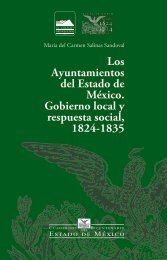

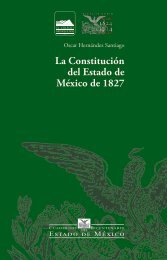
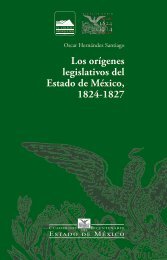
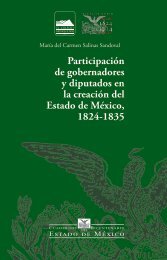
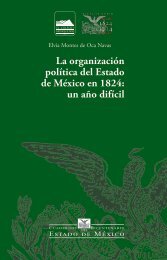


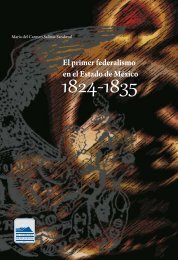
![El_primer_federalismoEM[final]_compressed (2)](https://img.yumpu.com/68483279/1/178x260/el-primer-federalismoemfinal-compressed-2.jpg?quality=85)


